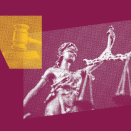Privacy & Technology
The ACLU works to expand the right to privacy, increase the control individuals have over their personal information, and ensure civil liberties are enhanced rather than compromised by technological innovation.

What you need to know
The Latest
Explore More
What We're Focused On
-

Consumer Privacy
The ACLU works in courts, legislatures, and communities to defend and preserve the individual rights and liberties that the Constitution and the laws of the United States guarantee everyone in this country.
-

Internet Privacy
The ACLU works in courts, legislatures, and communities to defend and preserve the individual rights and liberties that the Constitution and the laws of the United States guarantee everyone in this country.
-

Location Tracking
The ACLU works in courts, legislatures, and communities to defend and preserve the individual rights and liberties that the Constitution and the laws of the United States guarantee everyone in this country.
-

Medical and Genetic Privacy
The ACLU works in courts, legislatures, and communities to defend and preserve the individual rights and liberties that the Constitution and the laws of the United States guarantee everyone in this country.
-

National ID
The ACLU works in courts, legislatures, and communities to defend and preserve the individual rights and liberties that the Constitution and the laws of the United States guarantee everyone in this country.
-

Privacy at Borders and Checkpoints
The ACLU works in courts, legislatures, and communities to defend and preserve the individual rights and liberties that the Constitution and the laws of the United States guarantee everyone in this country.
-

Surveillance Technologies
The ACLU works in courts, legislatures, and communities to defend and preserve the individual rights and liberties that the Constitution and the laws of the United States guarantee everyone in this country.
-

Workplace Privacy
The ACLU works in courts, legislatures, and communities to defend and preserve the individual rights and liberties that the Constitution and the laws of the United States guarantee everyone in this country.
What's at Stake
“The fact that technology now allows an individual to carry such information in his hand does not make the information any less worthy of the protection for which the Founders fought.”
—U.S. Supreme Court Chief Justice John Roberts in Riley v. California (2014)
Technological innovation has outpaced our privacy protections. As a result, our digital footprint can be tracked by the government and corporations in ways that were once unthinkable.
This digital footprint is constantly growing, containing more and more data about the most intimate aspects of our lives. This includes our communications, whereabouts, online searches, purchases, and even our bodies. When the government has easy access to this information, we lose more than just privacy and control over our information. Free speech, security, and equality suffer as well.
The ACLU Speech, Privacy, and Technology Project fights in the courts, lobbies on Capitol Hill, and works with technology companies to ensure that civil liberties are protected as technology advances. We are working to secure a warrant requirement for law enforcement access to electronic information, to chip away at the government’s excessive secrecy surrounding its surveillance practices, to promote the proliferation of privacy-protective technologies, and more.
Americans should not have to choose between using new technologies and protecting their civil liberties. We work to ensure a future in which the Fourth Amendment ban on unreasonable searches extends to digital property and your data is your own.
“The fact that technology now allows an individual to carry such information in his hand does not make the information any less worthy of the protection for which the Founders fought.”
—U.S. Supreme Court Chief Justice John Roberts in Riley v. California (2014)
Technological innovation has outpaced our privacy protections. As a result, our digital footprint can be tracked by the government and corporations in ways that were once unthinkable.
This digital footprint is constantly growing, containing more and more data about the most intimate aspects of our lives. This includes our communications, whereabouts, online searches, purchases, and even our bodies. When the government has easy access to this information, we lose more than just privacy and control over our information. Free speech, security, and equality suffer as well.
The ACLU Speech, Privacy, and Technology Project fights in the courts, lobbies on Capitol Hill, and works with technology companies to ensure that civil liberties are protected as technology advances. We are working to secure a warrant requirement for law enforcement access to electronic information, to chip away at the government’s excessive secrecy surrounding its surveillance practices, to promote the proliferation of privacy-protective technologies, and more.
Americans should not have to choose between using new technologies and protecting their civil liberties. We work to ensure a future in which the Fourth Amendment ban on unreasonable searches extends to digital property and your data is your own.





